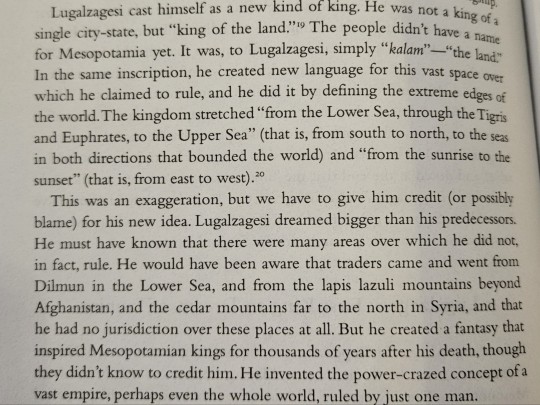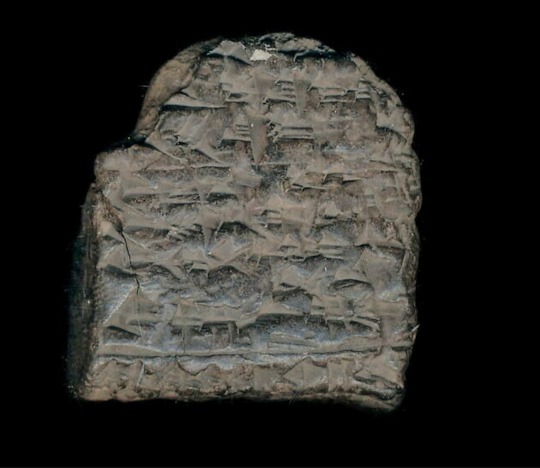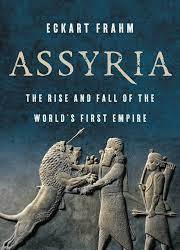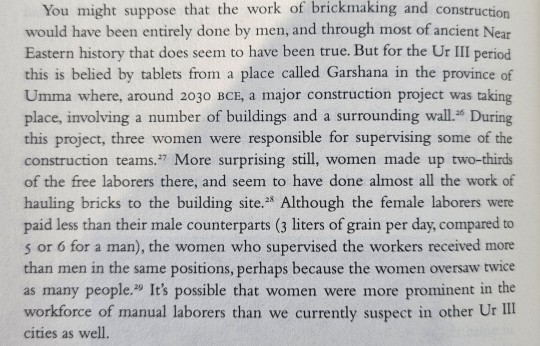#amanda podany
Text

Wildly amusing to me that we apparently literally know the name of the guy who invented imperialism.
Feel like we should hate him more. Use his name for demons and monsters in fantasy novels. Have a holiday about how shitty he was. That kinda thing. Just on general principle, you know?
2K notes
·
View notes
Photo

What the tablets say
Some 3,700 years ago, an enslaved girl, a barber, and a king crossed paths in a city by the Euphrates. This is their story - by Amanda H Podany Read at Aeon
https://aeon.co/essays/in-the-3700-year-footsteps-of-a-king-a-barber-and-a-slave
0 notes
Text
The term in Sumerian that we translate as “freedom,” amar-gi, literally meant “return to mother.” It’s a sad and touching image. Where we refer to freedom as an abstract ideal, they envisaged the concrete situation of a child moving from a place where she or he was enslaved, back to the safety and comfort of home and mother.
-Amanda H. Podany. Weavers, Scribes, and Kings
94 notes
·
View notes
Text
Learning shit is my favourite form of recreation but learning any new historical thing ever fucks me up so much bc adding any shred of context to the things I hate about life on earth today makes me want to scream. For example, like, a few months ago I was reading The Faithful Executioner by Joel F Harrington and realized very early into the book that our conception of the purposes of brutal medieval punishments reveals a LOT more about us than it does about the people who enacted them.
Shortly prior to the period during which Franz Schmidt, the subject of The Faithful Executioner, lived, responses to murder and other horrendous acts were typically managed by blood debt or other honour systems like those that play pivotal roles in the Norse epics and ancient Greek tragedies and are found in surviving legal codes from numerous other cultures.
Whatever your personal stance on avenging a loved one's death, a significant problem with these systems was that they often spun out of control in various ways, such as creating cyclical feuds between families or communities that could persist for decades, or facillitating an excuse for the victimization of community members who were simply unpopular.
A high priority of the judicial system at this time was to quell these cycles of violence by satisfying the aggrieved public. Making a public spectacle of things like executions and floggings was far more about averting a cycle of violence and supplanting extrajudicial punishments with judicial ones than the motives we so often ascribe to them.
The popular image of medieval tortures and public executions as being performed for their own sake, or to satisfy the laws of a wrathful Christian God, or as a crude attempt at deterring similar crimes comes more from our own perceptions of morality and criminality than from surviving historical records. It holds up a mirror to today's prevalent attitudes toward addicts, the extremely impoverished or unhoused, non-working people and people whose work is deemed to be of low or insufficient value.
People who believe in capital punishment today typically see condemned persons as needing to die for ontological reasons, not because of what the victim's family might do if the law doesn't satisfy them. These are so often the same people who will talk about who does and does not "deserve" food and shelter or about "teaching criminals a lesson." We ascribe these grotesque opinions retroactively to medieval people either because we're not conscious of how they pervade our own worldview, or to foster in ourselves a sense that today's cultures are definitively more enlightened and compassionate than those of the past.
Another example, a while ago I listened to Ancient Mesopotamia: Life in the Cradle of Civilization by Amanda H. Podany and I was repeatedly floored by her emphasis on both the symbolic and material ways in which the ancient Mesopotamian cultures she studies prioritized the wellbeing of community and family as a whole, including the lowliest members, over the exercise of a king's or head of household's (to them these were practically one and the same) powers. It might not quite be enough to make a motherfucker want to go back in time without antibiotics or water sanitation but it sure made me despair about how the fuck a culture like ours, which descends from theirs in so many ways, could have ever reached the point where we allow mass death and suffering on an unthinkable scale at the whims of hyperwealthy Musk-like and Bezos-like figures.
I dunno man. I'm not quite ready to say ignorance is bliss, but I so often feel like my specific interests and hobbies have rendered me very alone in seeing a certain angle of something being so very very wrong.
8 notes
·
View notes
Text
got myself a new book i've been excited about using xmas money called 'weavers, scribes, and kings: a new history of the ancient near east' by amanda podany and it's essentially a social history of ancient west asia/mesopotamia using new research from scholars working in the field and i love podany so much her way of writing and speaking is so warm and conversational and the way she talks about people of the past is with so much love and complexity it's just 👌🏽 i can't wait to read this
#her audio and video lecture series on ancient mesopotamia is one of my favourites#shes easily one of my favourite historians
115 notes
·
View notes
Text
My book wishlist!
Egyptian Magic by E.A. Wallis Budge (1901)
Magic of the Ordinary: Recovering the Shamanic in Judaism by Gershon Winkler, David Carson (2003)
Ashkenazi Herbalism: Rediscovering the Herbal Traditions of Eastern European Jews by Deatra Cohen, Adam Siegel (2021)
Jewish Magic and Superstition: A Study in Folk Religion by Joshua Trachtenberg (1939)
Ancient Jewish Magic: A History by Gideon Bohak (2008)
The Encyclopedia of Jewish Myth, Magic & Mysticism: Second Edition by Geoffrey W. Dennis (2007)
The Green Mysteries: An Occult Herbarium by Daniel A Schulke, Benjamin A Vierling (2023)
Reading Sumerian Poetry (Athlone Publications in Egyptology & Ancient Near Eastern Studies) by Jeremy Black (2001)
The Literature of Ancient Sumer by Jeremy Black, Graham Cunningham (2006)
Handbook to Life in Ancient Mesopotamia by Stephen Bertman (2002)
Weavers, Scribes, and Kings: A New History of the Ancient Near East by Amanda H. Podany
Auguste Racinet. The Costume History (Bibliotheca Universalis) by Françoise Tétart-Vittu
The Arthur of the Welsh: The Arthurian Legend in Medieval Welsh Literature by Rachel Bromwich (2009)
The Complete Dead Sea Scrolls in English: Seventh Edition (Penguin Classics) by Geza Vermes
Thomas Aquinas: Selected Writings (Penguin Classics) by Thomas Aquinas, Ralph McInerny
The Treasures of Darkness: A History of Mesopotamian Religion
by Thorkild Jacobsen
The Tibetan Book of the Dead: First Complete Translation (Penguin Classics Deluxe Edition) by Graham Coleman, Thupten Jinpa
The Egyptian Book of the Dead (Penguin Classics) by Wallace Budge, John Romer
History Begins at Sumer: Thirty-Nine Firsts in Recorded History by Samuel Noah Kramer (1981)
The Sumerians: Their History, Culture, and Character (Phoenix Books) by Samuel Noah Kramer
Welsh Witchcraft: A Guide to the Spirits, Lore, and Magic of Wales by Mhara Starling
An Annotated Sumerian Dictionary by Mark E. Cohen
A Sumerian Chrestomathy by Konrad Volk
Toward the Image of Tammuz and Other Essays on Mesopotamian History and Culture by Thorkild Jacobsen
Early Mesopotamia by Nicholas Postgate
Amulets and Talismans by E. A. Wallis Budge
Mundane Astrology by Michael Baigent, Campion, Nicholas, Harvey, Charles
8 notes
·
View notes
Note
book ask: 3
3. What were your top five books of the year?
very hard choice and fluctuating by the minute tbh.
At the moment lets say
5. Pale Lights
4. Last Exit by Max Gladstone
3. Some Desperate Glory by Emily Tesh
2. Weavers, Scribes & Kings by Amanda Podany
1. Giovanni's Room by James Baaldwin
8 notes
·
View notes
Text
What the tablets say
Some 3,700 years ago, an enslaved girl, a barber, and a king crossed paths in a city by the Euphrates. This is their story

by Amanda H Podany, professor emeritus of history at the California State Polytechnic University in Pomona
I was sitting in a quiet office in the Louvre Museum in Paris, a clay tablet in my hand, using a magnifying glass to make out words that had been inscribed on it in small, careful, wedge-shaped signs known as cuneiform. It looked diminutive in my palm, just 38.5 mm (1.5 inches) wide and 33 mm (1.3 inches) tall. On it, an ancient scribe had written a list of a dozen names. What lay behind this little document? Who were the men listed? When and how did they live? More than 3,700 years ago, when the scribe used his sharp stylus to press the names into the clay, listing goods distributed to each person, these men knew one another and worked together. Many of them must have had wives and families and professions. What more could I learn about their world?
"Looking at the tablet more closely, however, I felt a sudden jolt of recognition."
At that point, I was just beginning my graduate research in ancient Middle Eastern history, but I knew I was not the first person to read this tablet. Decades before, in 1923, a French scholar named François Thureau-Dangin had travelled to eastern Syria, searching for the site of an ancient city called Terqa, and he had been given this tablet, along with a handful of others, and had brought them back to the Louvre. He had also attempted a short excavation of the site that proved to be Terqa, now a village on the Euphrates River called Tell Ashara, but he had no luck in his goal of finding more clay documents. Thureau-Dangin subsequently read, analysed and published the few tablets he had acquired, noting their distinctive features and likening them to others that were already known from the antiquities market. I had read and re-read his article many times before going to Paris to look at the tablets for myself.
READ MORE
28 notes
·
View notes
Text
Assyria Book Review

I just finished reading Assyria by Eckart Frahm, and I would like to share my thoughts with you.
What is this book about? It follows the history of the Assyrian civilization from neolithic times to its collapse in 609 BC. It also looks at how Assyrian culture has influenced future civilizations including the modern world.
What do I like about this book? I like how the author provides a summery at the start of each chapter before delving into the details. He posses an exhaustive knowledge on the Assyrians and the other civilizations they interacted with, such as the Medes, the Egyptians, the Persians, the Babylonians, etc. I also liked how he didn't focus solely on the kings and their epic battles providing intermittent commentary on the commoners and their daily life.
What do I dislike about this book? I didn't like the times when the author switched the focus unto another civilization. Most times, I couldn't understand how the provided information helped me understand the Assyrians better. And sometime, it detracted attention away from the Assyrians. Perhaps a bit of trimming would have improved the narrative flow.
What do I rate this book? I rate this book a four out of five stars.
Would I recommend this book? Yes.
Why would I recommend this book? I would recommend this book because it provides a good introduction to the Assyrian civilization and their enemies/allies. It also provides information on the destruction of Assyrian archeological sites and artifacts by ISIS in 2015/2016.
To whom would I recommend this book? I would recommend this book to anyone who has an interest in ancient civilizations or wants to learn more about the Neo-Assyrians.
Note: If you liked this book, I would recommend Weavers, Scribes, and Kings by Amanda H. Podany.
Well, that's all I have for today. Until next time, take care and stay curious.
2 notes
·
View notes
Photo

Weavers, Scribes, and Kings: A New History of the Ancient Near East with Amanda H. Podany
In this interview, World History Encyclopedia sits down with author and Assyriologist Amanda H. Podany to learn all about her new book Weavers, Scribes, and Kings: A New History of the Ancient Near East published by Oxford University Press.
Kelly: Amanda, thank you so much for joining me today.
Continue reading...
37 notes
·
View notes
Text
youtube
"Looking for Leaders: The People Missing from Mesopotamian Royal Inscriptions" by Dr. Amanda Podany. The presentation is from the 2022 Opening the Ancient World conference and is about 45 minutes including Q&A
3 notes
·
View notes
Text

Slightly amusing to me how well documented the early bronze age wage gap was and how precise we can be about it.
747 notes
·
View notes
Text
Thank you @lampoost for tagging me <3
Last song played : he would have laughed by deerhunter
Currently reading : Jonathan Strange & Mr Norrell, and I'm reading a bunch of wonder woman comics too(love them both!)
Watching : i'm watching lectures on mesopotamian history by amanda podany(it's really good!) and superman the animated series when i'm eating
Current obsession : i'm not obsessed with anything i'm afraid.
tagging @napworthysunbeam and @vonnegutism
3 notes
·
View notes
Text
The scribes of the Early Dynastic period didn’t let us know what people believed about the afterlife during this era. To judge from the burials, though, they thought that you could take your wealth and power with you when you died. Even poor people were optimistic enough to include small treasures and pots of food for the dead in their tombs. Oddly enough, this concept seems to have been replaced by one in which the people believed that the dead lived on only in a dark, underground, comfortless world where kings had no more power than anyone else. This, at least, was the way the netherworld was described in two later literary works, the Epic of Gilgamesh and the Descent of Ishtar.
-Amanda H. Podany. Weavers, Scribes, and Kings
the SHWEP was recently talking about how after the end of the second temple period we see a shift from the traditional "flat" afterlife of sheol to the heaven/hell dichotomy, and the professor they had on theorizes this comes from the fact that jews were being persecuted for following the law, so it couldnt be "if you follow the law you'll be rewarded in this life" anymore, so the incentive had to shift to the next life. but anyway that makes me wonder about this earlier shift! why do we a shift from an afterlife where your earthly wealth can tag along to an afterlife thats just...flat and empty and neutral
33 notes
·
View notes
Text
What I read in May
The Day We Ate Grandad, CM Rosens ⭐️⭐️⭐️⭐️⭐️
Alien: Out of the Shadows, Tim Lebbon ⭐️⭐️
Jaws, Peter Benchley ⭐️⭐️⭐️
Room on the Sea, Andrē Aciman ⭐️⭐️⭐️
Alien: River of Pain, Christopher Golden ⭐️⭐️
Alien: Sea of Sorrows, James A Moore ⭐️⭐️⭐️
The Gentleman From Peru, Andrē Aciman ⭐️⭐️⭐️⭐️
Century Rain, Alastair Reynolds ⭐️⭐️⭐️⭐️
Hyperion, Dan Simmons ⭐️⭐️⭐️⭐️⭐️
Dust, Elizabeth Bear ⭐️⭐️⭐️⭐️⭐️
100 Fathoms Below, Steven L Kent & Nicholas Kaufmann ⭐️⭐️⭐️
Saturn's Monsters, Thomas K Carpenter ⭐️
Address Unknown, Kressmann Taylor ⭐️⭐️⭐️⭐️⭐️
Murder by Other Means, John Scalzi ⭐️⭐️⭐️
The Ethics of Aristotle, Joseph Koterski ⭐️⭐️⭐️⭐️
The Neil Gaiman at the end of the Universe, Arvind Ethan David ⭐️⭐️
Bag of Bones, Stephen King ⭐️⭐️⭐️⭐️
Bewilderness, Part One: Threshold, Jonathan Maberry ⭐️
Ten Low, Stark Holborn ⭐️⭐️⭐️⭐️
Benny Rose, the Cannibal King, Hailey Piper ⭐️⭐️⭐️
My Dark Vanessa, Kate Elizabeth Russell ⭐️⭐️⭐️⭐️⭐️
The Stars My Destination, Alfred Bester ⭐️
Three Hearts and Three Lions, Poul Anderson ⭐️⭐️⭐️⭐️
Almost Human(nf), Lee Berger & John Hawks ⭐️⭐️⭐️⭐️
Paladin's Grace, T Kingfisher ⭐️⭐️⭐️
Killing the Bismarck(nf), Iain Ballantyne ⭐️⭐️⭐️
Ancient Mesopotamia(nf), Amanda H Podany ⭐️⭐️⭐️
The Art of War(nf), Andrew R Wilson ⭐️⭐️
The White People, Arthur Machen ⭐️
nf= non fiction
stars awarded at my whim
2 notes
·
View notes
Text
[Download] The Ancient Near East: A Very Short Introduction - Amanda H. Podany
Download Or Read PDF The Ancient Near East: A Very Short Introduction - Amanda H. Podany Free Full Pages Online With Audiobook.

[*] Download PDF Here => The Ancient Near East: A Very Short Introduction
[*] Read PDF Here => The Ancient Near East: A Very Short Introduction
This book explores the lands of the ancient Near East from around 3200 BCE to 539 BCE. The earth-shaking changes that marked this era include such fundamental inventions as the wheel and the plow and intellectual feats such as the inventions of astronomy, law, and diplomacy.#374
0 notes